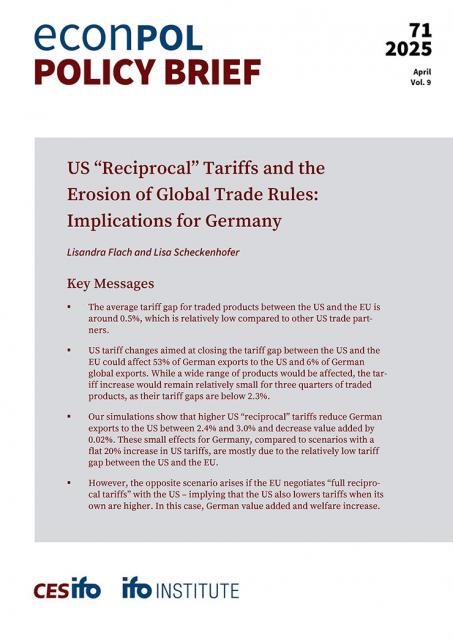News Archive

Online Public Procurement System Reduces Collusion in Ukraine
|
EconPol Opinion
| News
An e-procurement system launched by the central government in Ukraine in 2016 reduces collusion and leads to better market outcomes, according to research carried out by Bruno Baranek, Leon Musolff and Vitezslav Titl.

Auctioning Renewable Energy: How to Put a Price On It?
|
EconPol Opinion
| News
The European Commission has set one of its key climate and energy targets as achieving a share of at least 32% for renewable energy over total energy consumed by 2030. But despite such a large share up for grabs, the methods by which renewable energy is bought and sold are far from clear. Renewable energy auctions have been implemented globally; they’re currently taking place in most countries in Europe and beyond 100 countries around the world.

EU27 and the UK: Product Dependencies and the Implications of Brexit
|
Policy Brief
| News
The COVID-19 crisis has shown the importance of supply chain diversification to mitigate the negative effect of unexpected supply shocks; the decision of the UK to leave the EU poses additional challenges to foreign trade. Irrespective of the outcome of the Brexit negotiations, trade costs between the UK and the EU will increase as a response to Brexit and cause disruptions in trade relations. In this report, the authors take a detailed look at goods that are dependent on few suppliers and show only a few products are imported solely from the UK, repr

World Economy: What Does the Road to Recovery from COVID-19 Look Like?
|
Policy Report
| News
As the economy and our daily life return to a “new-normal” in the midst of Covid-19, the possibility of a second wave leaves lots of uncertainty about future developments. To understand indications about the impact of the pandemic on economic performance in different countries across the world, we conducted a survey among 950 economic experts in 110 countries. This report gives an overview of the most important results of the survey and compares them in different world regions and countries.

The Covid-19 Crisis, Italy and Ms Merkel’s Turnaround: Will the EU Ever be the Same Again?
|
Policy Report
| News
The functioning of the Eurozone was irreversibly transformed by the European debt crisis and now, as a consequence of the Covid-19 pandemic, a new and even more devastating crisis has hit the EU. German Chancellor Angela Merkel has abandoned her opposition to substantial intercountry transfers and any form of debt mutualization, a turnaround motivated by the exceptional circumstances brought about by the pandemic.
